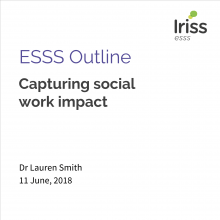The Care Inspectorate monitors how well local authorities are delivering social work services, and inspection reports focus on what social work services do particularly well and what they may need to do better - areas for improvement.
This case study demonstrates how East Dunbartonshire Council has utilised the evidence from their inspection report, as well as frameworks and supports that are founded on evidence to respond to the recommendations and make improvements.
The process for implementing change
East Dunbartonshire Council established a Community Care Improvement Group, which met monthly to establish key areas for action. The council ensured that this group was comprised of practitioners, as well as managers to ensure that changes were realistic, user-friendly and that there was sufficient buy-in from all levels of staff.
The action areas for development included:
- Moving towards an outcomes-focused report for assessment and support management - including training for staff around outcomes-focused practice
- Clarifying processes for dealing with risk at different levels
- Standardising assessment and support planning/review tools across all adult teams
- Producing practice standards at each stage of the assessment and support management processes tied to performance criteria
- Introducing routine case sampling across teams using a standardised format and introducing an annual case audit within community care
All changes to process, tools and documentation were discussed and signed off at the monthly meetings of the group. The group worked to a series of 10 'worksheets', which defined areas for action, tasks and responsibilities. These worksheets were updated after each meeting.
There were demonstrable added benefits of also involving members of the department's performance and information team. Staff from this team worked alongside practitioners to ensure that tools, standards, case sampling and the case audit were methodologically sound and consistent with national and local outcomes, and reporting requirements for Scottish Government and the council.
Evidence-based support
The group based the development of the tools for support planning and review largely on those recommended by the Department of Health, the evidence for which was based on the best aspects of tools used across 18 English local authorities. However, the group has adapted this to reflect the Talking Points approach, developed by the Joint Improvement Team, as a means to build-in user feedback at each review.
The group also delivered training on outcomes focused practice that was largely based on the IRISS training pack 'Leading for Outcomes', which proved to be an invaluable, well constructed and positively evaluated resource. The training comprised of one-day sessions run across all services to cover all community care staff.
Progress to date
To date the council has:
- Implemented outcomes-based tools for support planning
- Implemented assessment and support planning standards
- A process for case sampling which is now operational
- Completed the first annual case audit in December 2011, which has led to an action plan for ongoing practice improvement
- Provided training sessions for staff on outcome-focused practice which were delivered in November/December 2011 and which received excellent feedback
and will continue to review and reflect on the process as required and necessary.
Key learning
First and foremost, the council has learned that partnership working is vital when improving services - encouraging all key staff within the service to share their knowledge and experience and using this to work towards desired changes. There were huge benefits from including frontline practitioners and managers in agreeing and introducing changes to practice.
Furthermore, the implementation of tools and processes was clearly facilitated by comments and contributions made by practitioners prior to implementation. Establishing ownership and buy-in by staff involved in the group undoubtedly increased compliance and ownership from other staff.
The council realises that although the 10 worksheets are now fully completed, that they are really only at the beginning of moving towards embedding an outcome-focused approach in practice, which will be meaningful to service users, carers and partner agencies, as well as our staff.
The Community Care Improvement Group will therefore continue its work in moving forward around outcomes (including relating it to self-directed support). Additionally, the Council intends to continue to work with performance and information colleagues to ensure that evaluation is built in to the use of outcome tools.
Barriers to action
Although the headline challenge was to produce results which satisfied the Care Inspectorate that good progress had been made in the areas identified (which was indeed well and very positively referenced in the subsequent inspection report), the work of the group quickly took on a life of its own.
The additional time for staff could have been a barrier, but the commitment of both practitioners and managers amply demonstrated a strong professional wish to re-fashion practice and improve the experience for, and involvement of, service users and carers.
What East Dunbartonshire has learned along the way
- Problem areas identified by inspectorates can be a beneficial spur to initiating positive self-change
- Involving frontline practitioners can involve more work but is amply repaid in ensuring proposed changes are 'real' and do not feel imposed by staff
- A structured approach via regularly updated workplans is time consuming but a necessary discipline and demonstrates bit-by-bit progress
- If you get it right the change process itself can produce dividends in terms of staff morale and confidence, and hopefully also ultimately be of benefit to clients!
Example documents
Please see the supporting documents for examples.




